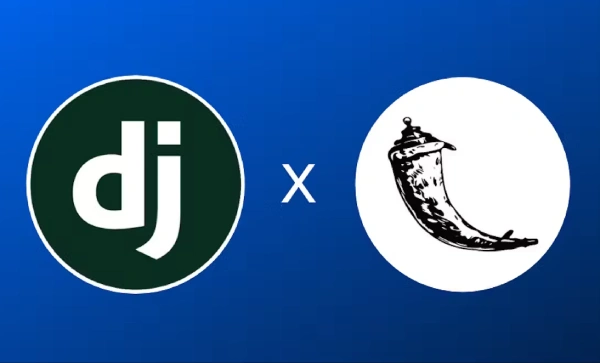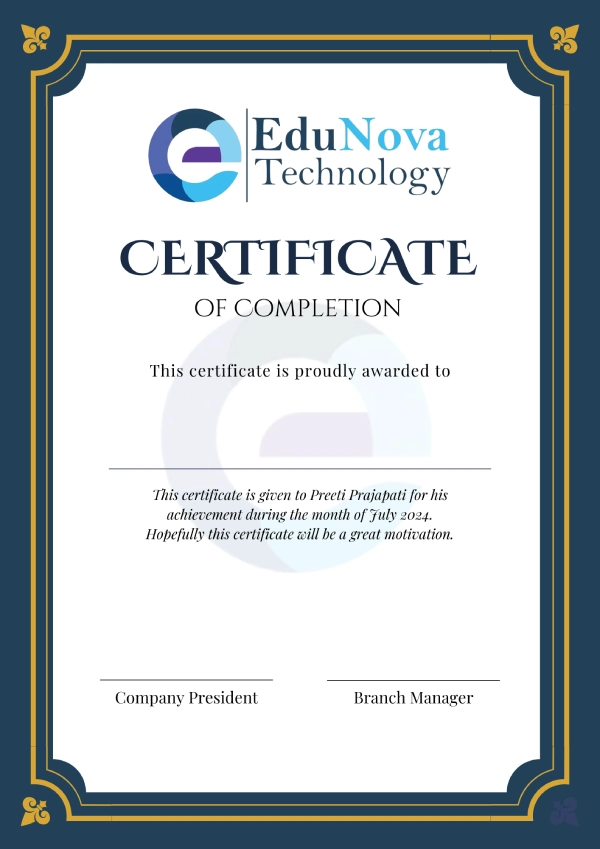- Introduction to Web Development Concepts
- Overview of Python
- Web Frameworks (Django, Flask, Pyramid)
- Setting up Python Development Environment (Virtualenv, Pip, IDEs)
- Introduction to RESTful API concepts
Web Technologies
Djnago & Flask
Have you ever thought of creating your own Dynamic Website?
Based on 99 Reviews
- Duration : 1 Month / 3 Months / 6 Months
- Language: English
- Certificate of Completion

The Django & Flask course is designed for developers who want to master Python-based web frameworks for building dynamic and scalable web applications. This course provides an in-depth understanding of Django, a high-level framework that emphasizes rapid development and clean design, and Flask, a lightweight framework offering flexibility and simplicity. You’ll learn to create RESTful APIs, manage databases, implement authentication, and deploy your applications effectively. Through hands-on projects and real-world scenarios, this course equips you with the skills to develop both monolithic and microservice-based applications, catering to a wide range of web development needs.
- What is Flask?
- Flask installation and setup
- Flask application structure and folder organization
- Flask routing and request handling
- Request and Response objects in Flask
- HTTP methods (GET, POST, PUT, DELETE)
- URL building and route parameters
- Flask templates using Jinja2
- Introduction to Jinja2 templating engine
- Dynamic HTML generation using templates
- Rendering templates with context
- Static files in Flask (CSS, JS, images)
- Creating reusable templates and partials
- Creating forms in Flask
- Handling form data (GET and POST)
- Flask-WTF for form handling and validation
- Form validation (required fields, email, length)
- CSRF protection in forms
- Introduction to Flask SQLAlchemy
- Setting up SQLite and MySQL databases with Flask
- Performing CRUD operations using SQLAlchemy ORM
- Database migrations with Flask-Migrate
- Relational database models in Flask
- Handling database connections and sessions
- User authentication in Flask (sign up, login, logout)
- Flask-Login for session management
- Password hashing with Werkzeug
- Role-based access control (RBAC)
- Flask-Principal for permissions and roles
- Build a Flask-based web application that includes:
- User authentication (sign up, login, logout)
- CRUD operations with SQLAlchemy (database interaction)
- RESTful APIs using Flask-RESTful
- Form handling and validation with Flask-WTF
- Error handling and custom error pages
- Deployment on Heroku or AWS
- What is Django?
- Overview of the Django framework
- Setting up a Django project and app
- Django project structure and settings
- Django URL routing and views
- Django views and URLconf
- Django templates (HTML rendering with context)
- Django views (function-based and class-based views)
- Using Django templates for dynamic content rendering
- Template inheritance and including partial templates
- Working with static files (CSS, JS, images)
- Template filters and custom tags
- Handling forms and templates together
- Introduction to Django ORM (Object-Relational Mapping)
- Setting up databases (SQLite, PostgreSQL, MySQL) in Django
- Creating Django models and defining relationships (One-to-Many, Many-to-Many)
- Running migrations (makemigrations, migrate)
- Querying databases using Django ORM
- Django admin interface and CRUD operations
- Introduction to Django Forms
Creating forms using Django’s built-in form classes - Handling form data (GET and POST)
- Form validation (required fields, custom validation, cleaning data)
- CSRF protection in forms
- Using Django ModelForms for database models
- User authentication in Django (login, signup, logout)
- Django user model and extending it
- User registration and password reset functionality
- Login required decorators and login URLs
- Django permissions and role-based access control (RBAC)
- Customizing Django’s authentication system
- Introduction to Django REST Framework (DRF)
- Setting up DRF in Django projects
- Creating serializers for data conversion (JSON, XML)
- Building RESTful APIs with DRF (GET, POST, PUT, DELETE)
- API authentication (Token-based, JWT, OAuth2)
- Filtering, searching, and pagination with DRF
- ViewSets and Routers in DRF
- Testing and debugging DRF APIs
- Introduction to Django Admin Panel
- Customizing Django Admin for your models
- Creating custom admin views and forms
- Admin site configurations (search fields, list displays)
- Django admin security and access control
- Introduction to middleware in Django
- Using middleware for requests and responses
- Custom middleware creation in Django
- Error handling and custom error views
- Handling 404, 403, 500 errors in Django
- Preparing Django for production (settings configuration)
- Django deployment on cloud platforms (Heroku, AWS, DigitalOcean)
- Setting up production-ready databases (PostgreSQL, MySQL)
- Using Docker for Django deployment
- Configuring Nginx and Gunicorn for production
- SSL, security practices, and performance optimization
- Build a Django-based web application that includes:
- User authentication with Django’s built-in system
- Models, views, and templates for CRUD operations
- RESTful API development using Django REST Framework
- Form handling and validation with Django Forms
- Django Admin customizations
- Deployment on Heroku, AWS, or DigitalOcean
This Course Include
- Language: English
- Duration : 1 Month / 3 Months / 6 Months
- Learning Mode: At Center ( Only Offline Classes )
- Jurisdiction: Nationwide
- Certificate of Completion
Eligibility Criteria
- Learner should preferably a std. 10th Pass student (Not Compulsory)
- It is desirable that Learner should have done MS-CIT Course (Not Compulsory)
Premium Course
Register For This Course
About Ms. Anjali Arora
Enroll in EduNova’s Flutter App Development Course and master the art of building stunning, high-performance mobile apps for both iOS and Android. Our expert instructors will walk you through each step of the development process, from installation and setup to debugging and deployment. You’ll gain essential programming skills, including Dart fundamentals, such as `const`, `static`, and `final` keywords, as well as Object-Oriented Programming (OOP) in Dart.
Based on 99 Reviews
Ready to take your team to the next level?
Contact us today to learn more about our Corporate Training programs and discover how we can help your organization thrive.


- IITM Pravartak certified Python certification.
- Certificates are globally recognized & they upgrade your programming profile.
- Certificates are generated after the completion of course.














Students/ Job Seekers

Business
Owners

Influencers/ Youtubers

Work as Freelancers

Working Professionals

Women / Housewives
They are unique because of their unique approach i.e; Placement, training then Hike. Firstly, they get students placed then give 8 Months of training in any Certification of your choice and at least a 70% hike after 10 months.
Click on Side menu- Choose Courses- Select the course you want to see- Course Detail page will open- click on Start Learning on top- now you can Enrol for the course.
Yes. We offer certifications upon course completion.
Python
Data science
Artificial Intelligence
Digital marketing
Cyber Security
Data Analytics
Quantum computing/ Cloud computing
Android App development
Web development


